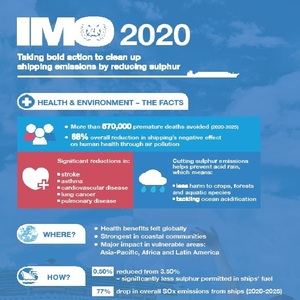Japan Engine, NYK Line cooperate in marine biofuel test

Source: International Maritime Organization
May 21, 2019
BY Ron Kotrba
Japan Engine Corp. is collaborating with Nippon Yusen Kaisha (NYK Line) to begin testing marine biofuel provided by GoodFuels. The test engine is located in the Mitsubishi Heavy Industries Research & Innovation Center.
The news comes after a string of biofuel tests in marine applications resulting from regulations and initiatives by the International Maritime Organization to reduce smokestack and greenhouse gas (GHG) emissions.
Come Jan. 1, 2020, IMO regulations impose a global sulfur cap in bunker fuel of 0.5 percent, down from 3.5 percent currently. Furthermore, IMO’s GHG reduction strategy aims to reduce GHG emissions by at least 50 percent from 2008 levels by 2050. The IMO’s ultimate goal is to phase out GHG emissions from shipping entirely.
Advertisement
“To realize the decarbonized society which does not depend on fossil fuels, through the reduction of GHG [emissions] in the shipping industry, [we] will continuously move forward to innovate and provide alternative energy solutions for [the] future,” stated Japan Engine Corp.
Advertisement
Related Stories
Wheels Up Experience Inc. on May 6 announced the launch of its new SAF program, under which Wheels Up will partner with Delta Air Lines to purchase SAF, allowing private fliers to participate regardless of their flight operator or departure airport.
Germany-based Mabanaft on April 17 announced it started to supply SAF to airlines at Frankfurt Airport in January. The company said it will deliver more than 1,000 metric tons of SAF to the airport this year under the European SAF mandate.
easyJet and ATOBA Energy, in partnership with World Fuel Services, announce the signing of a memorandum of understanding for the development of long-term supply of SAF for easyJet’s operations in Europe and the U.K.
EVA Air announced the signing of sustainable aviation fuel (SAF) procurement agreements with three major suppliers: AEG FUELS from the U.S., COSMO Oil Marketing Co. Ltd. from Japan, and Formosa Petrochemical Corp. from Taiwan.
As the demand for fleet decarbonization continues to intensify, Optimus Technologies on April 22 announced the production launch of its latest Vector System, a fuel system technology that enables heavy-duty engines to operate on B100.
Upcoming Events










